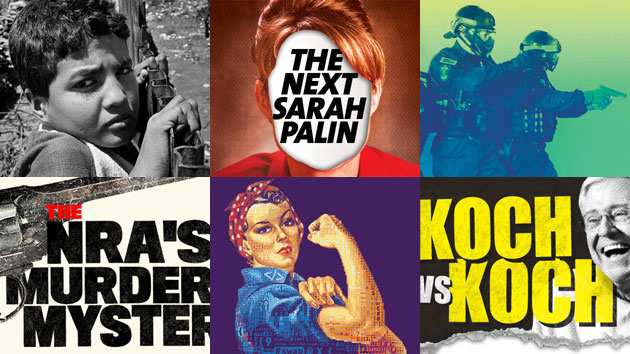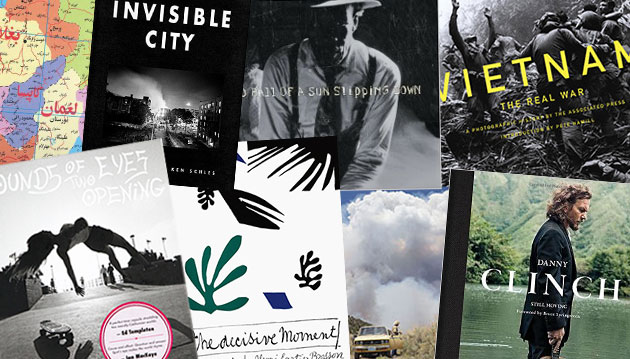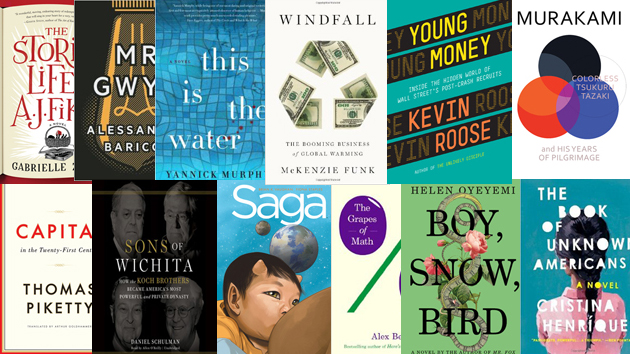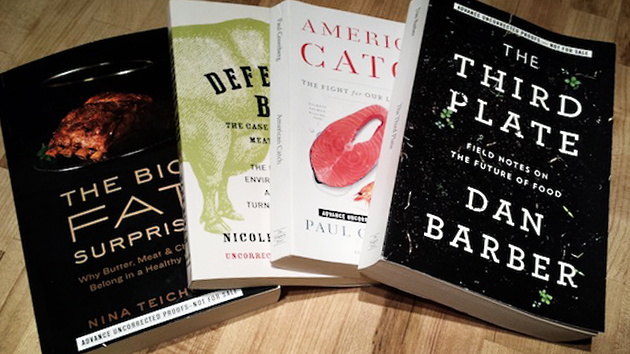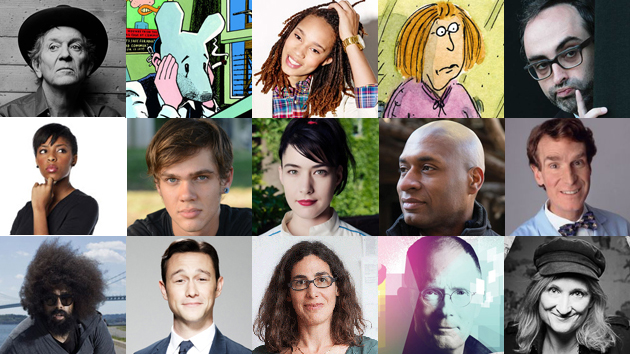
Wow, looking back, we’ve had the privilege of talking to some really talented and interesting people this past year. This is just a fraction, actually. I didn’t want to overwhelm you. But no matter your interests, you’re bound to find something below that’s up your alley.
On Feminism

“It’s really cool that Miley Cyrus said she’s the biggest feminist ever. I was like, ‘That’s the sound of 200,000 eight-year-olds Googling the word “feminist!'” —Riot Grrrl icon Kathleen Hannah, now back on stage with her latest band, The Julie Ruin
On Preparedness
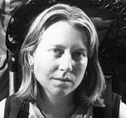
“If you want to read anything nasty about me, just go to the backpacker websites. I mean, lots of outdoor people love Wild, but there’s this kind of elitist branch where they really believe that I had no business going backpacking. I get blamed: “Oh, Cheryl Strayed, it’s her fault if somebody needs to be rescued.” First of all, things have gone awry in the wilderness well before Wild was ever published. But I actually don’t have any fear of people reading Wild and going out unprepared. Because one of the best things that ever happened to me was that I went out unprepared.” —Author Cheryl Strayed, whose memoir is now a film starring Reese Witherspoon
On Rock and Roll
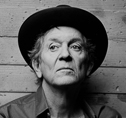
“Before I leave this world, if I can create something that’s timeless and museum quality, then it will have all been worth it. And if I don’t? It would have still all been worth it.” —Country music luminary Rodney Crowell
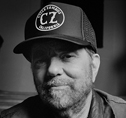
“It’s a lesson that I learned in Toronto when I was a kid and played guitar on sessions. The studio people were forever rummaging through closets, fishing out equipment. Hours would go by, people would be in the game room playing pinball while some other guy hit the snare for hours on end. I said to myself, “Is this what rock ‘n’ roll is about? The Ramones walk in the door and they’re going to play pinball? No way! I want the Ramones walking in and rocking out!” —Daniel Lanois, producer of iconic albums by U2, Bob Dylan, and Peter Gabriel
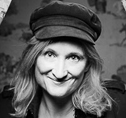
“Whereas my friends might listen to the songs, I would spend hours looking at the liner notes and figuring out who did what and listen to the productions. I don’t think other kids would listen and think, ‘Oh, that’s an interesting bass sound.’ Whenever I was sick at home my dad would bring me a vinyl record. I remember getting David Bowie’s Station to Station when I had the flu.” —Singer/songwriter Jill Sobule
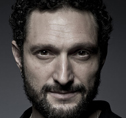
“I really see the rock movement as the revolution that happens in the aftermath of destruction. It’s the thing that people don’t talk about. Media always talks about war, but nobody really talks about the day after, and the year after, and the five years after—what it means to rebuild. It’s that hidden story that’s less sensationalist, and less sexy. It’s much more complex, and much more human. You are confronted with your own inadequacies when you start thinking about the difficult things, the work of what it is to be human.” —Jeremy Xido, director of the documentary Death Metal Angola
On Being Young and Gay
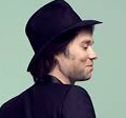
“I knew when I was signed, at the age of 23, in Hollywood, at a huge studio, that the fact that I was openly writing about my homosexual lifestyle and that I presented myself as an out gay man was very, very unusual…People tried to persuade me to hide it and be a little more mysterious. But I didn’t want to hear any of that.” —Songwriter Rufus Wainwright
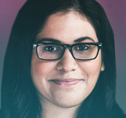
“My first crush, as early as age 5, was Gadget the Mouse from Chip ‘n Dale Rescue Rangers. It didn’t bother me that she was animated, or a mouse. It bothered me that she was female. I had these inclinations, and was really terrified by them.” —Sara Farizan, whose gay-themed YA novels have been an unexpected hit
On Sexism in Art, Science, and Technology
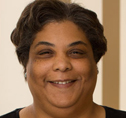
“I don’t read the comments anymore, unless they are moderated. Which is not to say censored, but I don’t need to read someone saying, “You’re ugly.” Nasty emails I delete. I read them, and of course it hurts. I’m human, and I allow myself to feel that hurt. But I also try to keep it in its proper place. This is not someone who deserves my time. They don’t deserve my pain. I try to remember that.” —Roxane Gay, author of Bad Feminist, on dealing with the inevitable trolls
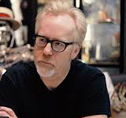
“Shit’s tough for girls…I wish I understood it better. Because I see it, and I have friends that suffer from it. And I worked with Kari Byron for 11 years, and I’ve watched the evolution of the terrible shit Kari’s had to deal with as a public figure and a woman and a science communicator.” —Mythbusters star Adam Savage on sexism in science and tech
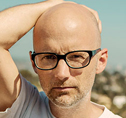
“What I also found really odd, when I was criticizing Eminem for being misogynistic, is how few people came to my defense. I’m not trying to look for pity or sympathy. I was just surprised that so many people in the world of entertainment seemed to be okay with misogyny and homophobia as long as they were profiting from it.” —Musician Moby, on his public feuding with Eminem
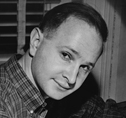
“There’s no rap against comics that isn’t true. They were sexist, they were racist, you name it—and they kind of gloried in that. If someone attacked them, back in the time I was growing up reading comics in the ’40s and the ’50s, the purveyors would look at you not knowing what the hell you were talking about. This is just what they did: ‘What’s wrong with this?'” —Jules Feiffer, who released his first graphic novel this year at age 85
On #Gamergate

“You hear a lot of this. ‘Why are you dragging real-life politics into cyberspace? I go to gaming to get away from real-life issues.’ For a lot of geeks, gaming is all about stripping who you are completely and entering this imaginary space, this world that’s made for you, where winning and losing have nothing to do with real life. They try to argue that representation in games has not been an issue because nobody is really themselves in a game; it’s all just avatars. They’re not seeing the many ways in which that’s not true.” —Jeopardy champ Arthur Chu
On Race

“I’m not walking around feeling black all the time. That would stress me out. It would make me crack. Some days I do feel that pressure of, “What do I mean as a black woman? What am I representing?” It honestly just gives me anxiety.” —Daily Show correspondent Jessica Williams
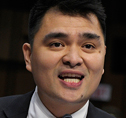
“It’s so easy to hate something you don’t know. What’s harder is to actually scratch the surface.” —Journalist Jose Antonio Vargas, who is making a documentary about the experience of young whites in America
On Fame

My husband “doesn’t give a shit about all the VIP. We’re going to the Glastonbury Festival this weekend, and I was like, ‘Someone’s given us a hotel if we want it,’ and he’s like, ‘Why the fuck would we have a hotel? It’s Glastonbury! We’ve camped since we were 20.’ And there’s the Jewish princess in me being like, “Please say yes to the hotel. Please say yes to the hotel.” —British popstar Jessie Ware
On Environmental Mayhem

“The [BP] spill happened, and then nothing happened. I hope the film can address why nothing happened, and I think a lot of that is Congress. But also that, the minute it got off the news, people stopped thinking about. It seemed like, ‘Okay, they capped it. It’s gone.’ But actually, there are no new safety regulations. It’s not gone. —Filmmaker Margaret Brown, whose documentary The Great Invisible tells the inside story of the Deepwater Horizon disaster
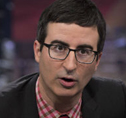
“I’m not an activist, but as a comedian, some of how it is talked about is incredibly funny to me. The stridency, and the intense comfort with a lack of scientific information, is ludicrous—it’s objectively ludicrous…This world will be a complete ball of fire before it stops being funny.” —Comedian John Oliver, on climate change

“If you’re asking in the abstract, ‘What could you do to really mess up a lot of species?’ it would be hard to design a better system than the one we’ve got. Practically everything is on the move now, in some way, because of climate change. And they’re going to run up against all these man-made barriers. We’ve completely changed the rules of the game.” —Elizabeth Kolbert, author of The Sixth Extinction
On Technological Change
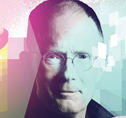
“One of the things I loved about the series Deadwood was that sense of just how deadly clever people in the 19th century probably really were. If those guys got out of the time machine now in downtown Los Angeles, they wouldn’t be hopeless hicks. They’d be very dangerous characters, simply because they were. And the people in my 22nd century initially assume that anyone they’re dealing with back in 2025 or whenever is just kind of a hick.” —Author William Gibson on his latest novel, The Peripheral
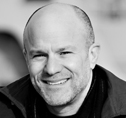
“The problem with social media is that people respond therapeutically. It is therapeutic to hit back against your enemies, but it is not necessarily strategically wise. McDonalds and JPMorgan opened up Twitter conversations that were taken over instantly by their detractors. People in my industry would like people to believe we have ways to control it. But that’s one of the great swindles.” —Corporate crisis-management guru Eric Dezenhall
On Politics and Politicians
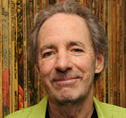
“It became obvious that there were really funny characteristics about this guy, chief of which would be that he seemed to devote about 85 percent of his waking energy to suppressing any sign of his emotional response to anything that was going on around him, and the other 15 percent blurting out those authentic responses in the silliest and most inopportune ways. And he had these smiles that would come at the most inappropriate times—just flashes that there was an inner life screaming to get out. —Actor Harry Shearer on portraying Richard Nixon

I can’t say I follow the ins and outs of electoral politics closely, but I tend to think having an impact on the world is a lot more complicated than government. If I were to point to the person who’s having the greatest impact, I wouldn’t be naming that many government officials. I’d point to, for example, Elon Musk. —Actor Joseph-Levitt
On Scrabble
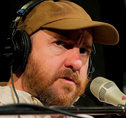
“The last time I attempted Scrabble with an interviewer, I accidentally stole 12 tiles from the Bryant Park public Scrabble set.” —The Magnetic Fields’ Stephin Merritt on his recent book, 101 Two-Letter Words, illustrated by Roz Chast (see below)
On Professional Sports

“Short shorts are not for everybody. I’m not trying to wear capris, but I got a lot of leg. I need to cover it up a little bit. They want more male attendance, and for us to change our uniforms to “sleek and sexy” takes away from what we’re trying to do on the court. I want you to come watch my game, not the uniforms. If you wanna come just because we look sexy, then I really don’t want you there.” —WNBA star Britney Griner
“The NFL is a culture that values secrecy. When you’re with an NFL team, the message to you is clear: Don’t fuck anything up for your partner, and don’t fuck anything up for the team. Don’t be controversial. Don’t talk to the media. Stay out of the way. Support the player and be quiet.” —Tracy Treu, a former NFL wife, on the league’s domestic violence problems
On Crime and Punishment

“When you hear about a case—even if you’ve attended a trial—there’s a story presented which is a kind of agreed-upon narrative that each side brings…The thing that hooked me is realizing that the story they’re telling at trial is just one layer that’s just sitting on top of this whole super-interesting ocean that we don’t ever get to hear about.” —This American Life producer Sarah Koenig, speaking shortly before the premiere of Serial, her wildly popular podcast

“What really interested me was the moral divide in all of us: In trying to do the right thing, where’s the line you cross? At what point have you gone irrevocably into moral hazard? Every character in our show, practically, crosses that line.” —Scandal star Tony Goldwyn on creating The Divide, a new drama about the death penalty
On Shooting a Film Over 12 Years

“It’s such a crazy, wildly impractical idea. The logistics were tough enough that we didn’t even talk about doomsday scenarios. We’re all just a phone call away from our lives changing pretty enormously, so you kind of play the odds. I remember saying to Patricia [Arquette], ‘Where are you going to be 12 years from now, just theoretically?’ It wasn’t hard to convince an adult to jump in. A kid, they’re not even aware what they’re getting into.” —Richard Linklater, director of Boyhood

“Rick made a conscious decision to not have Mason do anything I hadn’t already done. Looking back, I now see that he would feel it out and see, like, ‘Is he still a virgin? Has he gotten drunk yet? Has he done drugs?’ And then he would throw those things in.” —Actor Ellar Coltrane, who was six years old when Linklater cast him as his lead
On Gun Rights
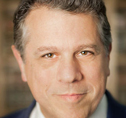
“When you actually go back and look at the debate that went into drafting of the [Second] amendment, you can squint and look really hard, but there’s simply no evidence of it being about individual gun ownership for self-protection or for hunting. Emphatically, the focus was on the militias…Every adult man, and eventually every adult white man, was required to be in the militias and was required to own a gun, and to bring it from home. So it was an individual right to fulfill the duty to serve in the militias.” —Michael Waldman, author of The Second Amendment: A Biography
On Being a Zombie

“I get email after email, and I get stopped on the street—which is sort of astounding, considering I’m not an on-camera guy. People will come up and go, ‘How do I get to be a zombie on The Walking Dead?’ They don’t think about the fact that it’s 120 degrees outside, and you’re going to be sitting in a makeup chair for an hour and a half, and you’re going to be sticky and hot, and you’re going to work all day, and then at the end of the day we’ve got to use all the remover. It sounds more glamorous than it is.” —Makeup effects guru Greg Nicotero
On Improvisational Performance
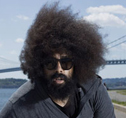
“I think about the audience. I just want to make sure they’re having a good time. I don’t want them to think that I’m just going off and not giving a fuck about them. [Laughs.] So there’s that.” —Weirdo comedian and musician Reggie Watts
On Dealing With Aging Parents
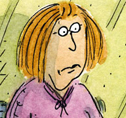
“You didn’t throw away jar lids or Band-Aid boxes. There was a drawer of those amber plastic vials, what pills come in—you might need them for, I don’t know, three cotton balls or something. It was borderline hoarding.” —Cartoonist Roz Chast, author of the memoir Can’t We Talk About Something More Pleasant?
On Pulitzer Prizes
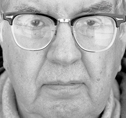
“I was teaching in Uvalde, Texas, the day I won. I gave six speeches that day. My friend Susan Freudenheim told me I had won the prize. I was too busy to have much of a reaction to it. I once owned a collection of 77 novels that won the Pulitzer. The only good novel of the bunch was The Grapes of Wrath.” —Lonesome Dove author Larry McMurtry, whose latest novel is titled The Last Kind Words Saloon
On War
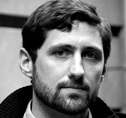
“I saw Donald Rumsfeld selling a book of leadership tips on Meet the Press and the Today Show, and I was like, ‘How is this possible?’ I understand why anti-war folk don’t like Rumsfeld, but if you were pro-war you really shouldn’t like him, because he messed it up and invalidated your whole worldview.” —Phil Klay, Iraq War veteran and recent author of Redeployment
On Art
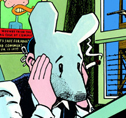
“What I’ve seen recently is the creative class finding a way, like the rest of the culture, to peddle in capitalist ventures of one kind or another so they can afford to be where they want to be, and it gets harder and harder and harder. The process of gentrification now takes about eight minutes.” —Artist Art Spiegelman, who published a major retrospective in 2014
On Personal Struggles

“Before [my first] novel, I was dating a woman who later went to prison for bashing a guy with a hammer. And she had another boyfriend! Can you imagine the depths of self-rejection one would have to reach in order to have a relationship like that?” —Author Gary Shteyngart, whose recent memoir is titled Little Failure
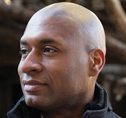
“When I won my way to the international science fair, I didn’t want to embarrass myself. It was the first time I was going to be away from home, the first time taking an airplane. I went to the local library, checked out every single etiquette book, and I read those books like I was uncovering some sort of treasure. I committed every one of the rules to memory. When somebody puts down four forks on one side and four spoons on the other side, what does that mean? All of a sudden I knew what to do when the food dropped from the table and how to signal that you were finished and how to signal that you wanted coffee—all these little intricacies that just did not come into our lives because we were poor.” —New York Times columnist Charles Blow, whose recent memoir is titled Fire Shut Up In My Bones
On Teaching Science
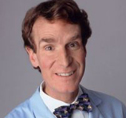
“A TV show has to be entertainment first, education second. I spend a lot of time with Nobel laureates and a lot of rocket scientists. Being a good teacher is a completely different skill from being a good scientist.” —Bill Nye (the Science Guy)


